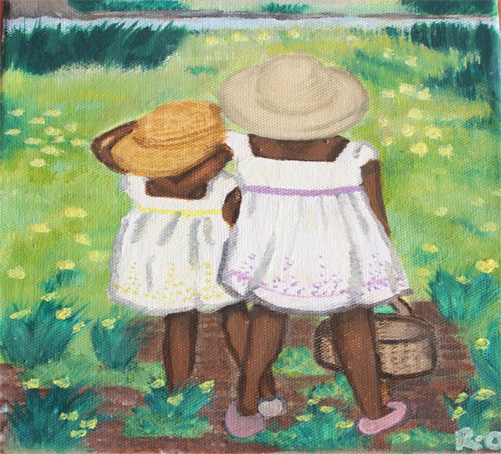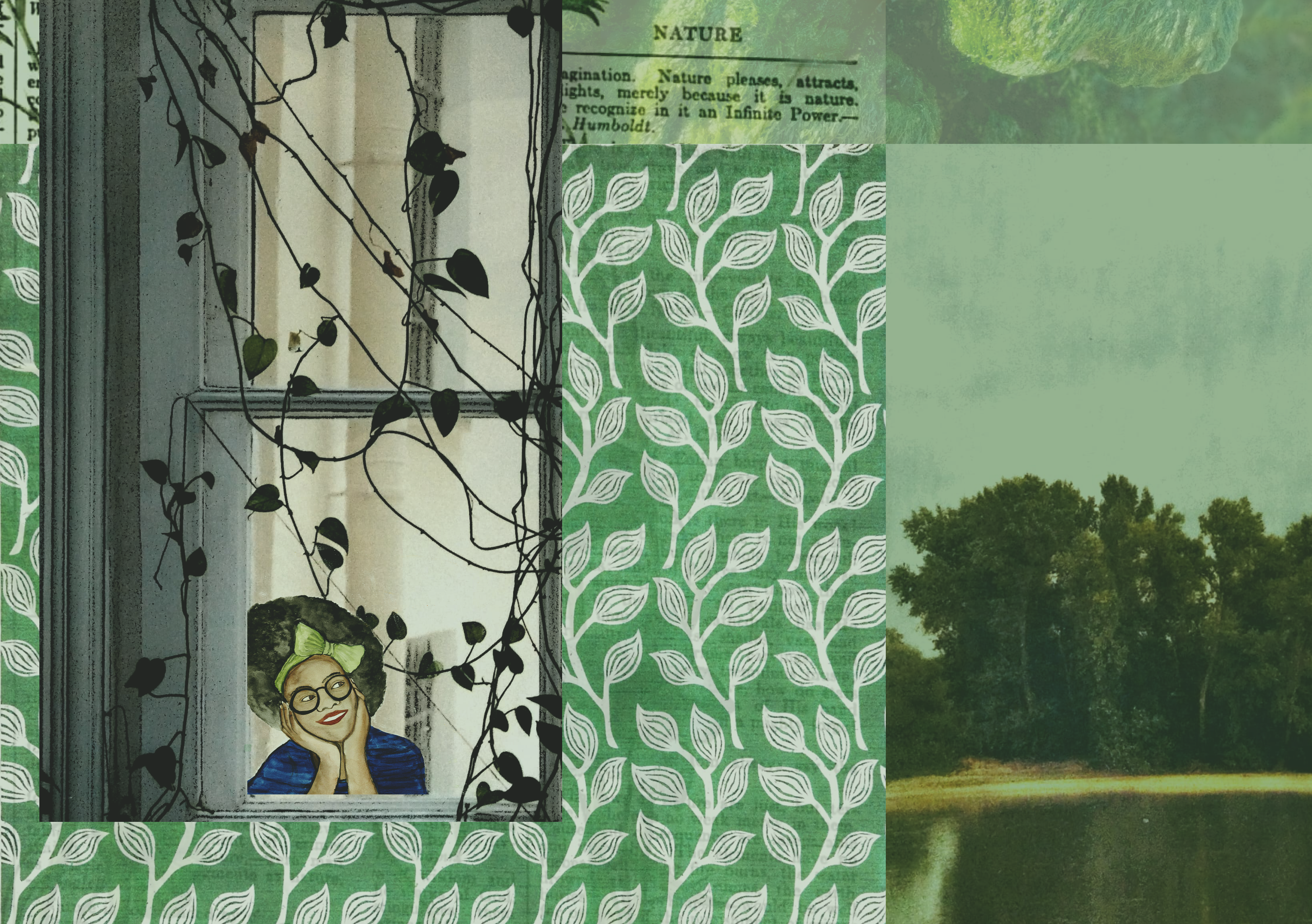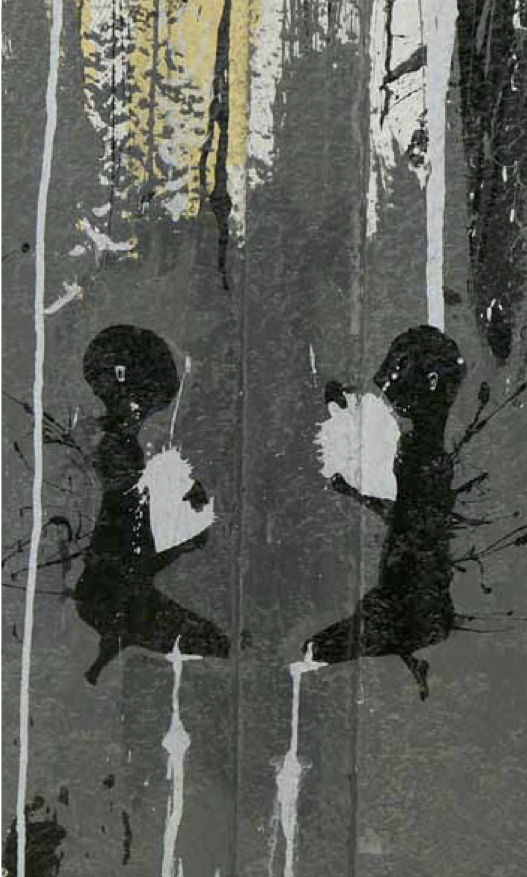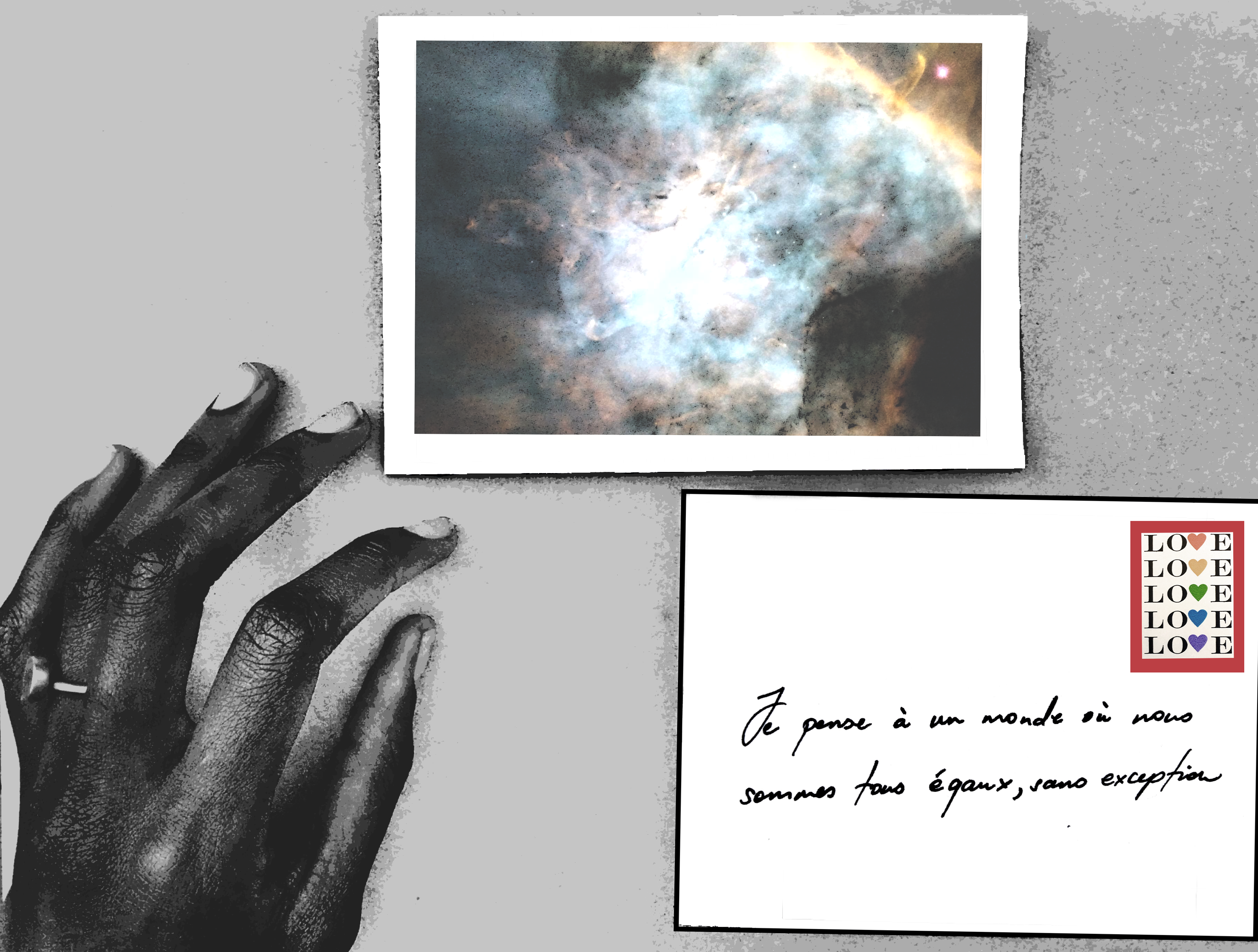The Voice is the First to Go
By Alexis Teyie. Painting by Roseline Olang Odhiambo
Her body reeked of hunger. I could smell it even when she laughed that precarious laugh of hers, like it was lurking behind her teeth and only fell out in place of a howl.
No one understood what drew me to the odd stranger who simply appeared one day at our local hangout. Maybe it was that lovely gap between her teeth, or the delicate ankle I leaped off an Eldoret Express to track. Or her eyes then, how they would crouch closer to her cheeks, fanned by featherless wings like the skeletons of twin cranes. Maybe it was the way she folded those legs beneath her when she sat, how her body was always in knots. How I lived to unravel her.
Some nights I wake up convinced I know: Bas! It’s her hair, I shout into the dark.

It was this that first summoned me. It must have been. Those impossible curls begging to be wound round curious fingers, how they always sprung back no matter how many times I tugged. That there is such a certain thing in the world, hai. The little cabbage patch at the base of her skull, how she would quiver when I stroked it. The matted feel of it against my cheek during our borrowed mornings? Alhamdulillah. She wasn’t like the other women in those days. Had no patience for weaves and extensions and Darling braids and such. Besides, they gave me a rash. It’s funny, then, that we first met in a salon.
It was one of those vibanda with mabati roofs, and walls stooping as if sucked in by the combined heat of 6 red China blow dryers. Mama Jemo’s Hot Stylez, Salon and Kinyozi. Its skin was papered with campaign posters from the last election and on the insides, images of the various styles etched in charcoal. Some people thought it wasn’t all that hot but Mama Jemo was cool you see, and let some of us guys play pool next door even after curfew. Sometimes she slipped us the extra chang’aa from her side hustle, and we were glad for any free alcohol. We’d take a Tusker if we could only because it made you look loaded and who knows? Do rich people things long enough…Anyways, I preferred the local brews. Made me feel all warm inside and I thought it comical, all of us sitting round some filthy jerry can, drinking this nasty stuff, coughing and laughing and thinking, life’s not so bad.
Maybe that’s why I hung out there so much, even after we were no longer in the same classes. Many of them quit; we all have our places, our reasons. The boys wanted to get some money rolling in, afford some Tusker I guess. The girls, they were rolled in alright, got pregnant, the usual story (too much free Tusker I guess). I sat there, smoking anything I could bum off someone, chilling. I listened to all their stories, nodded, eh-hhed when appropriate, held their stuff for them when I was sure the cops had received some dough for chai. It all made me feel full, you know? There was a lot of life outside the butchery and Mama Jemo’s place. I mean I got invited to lots of harambees and such, raise funds for a wedding, graduation, naming, new house etc. Mostly funerals though.
Anyhow, that day I scraped together a few shillings for some lunch and half a cigarette. Figured I’d say hello to the tailor outside Mama Jemo’s salon. Heard her other kid got mowed down on some highway. I wasn’t too surprised she was back so fast after sowing Boi in the ground; people have to eat eh. Still, few things are as soothing as that quiet humming Singers make, spitting out clothing from bits of loose fabric. Also, I guess I liked to watch the women in the salon trying to figure out their hair numbers from the weirdly detailed list on the back of some calendar from ‘91.
Then I saw her.
Loveliest dhira I’d ever seen on a woman, this willowy thing nearly drowning in batik fabric– face all eye, eye all dark sparkle. She was baaaaad, jo. The first thing she said to me when I hesitated at the salon’s opening–even though I’d hung out there since I turned 12– was, Better than Linnaeus’ shit si ndio?
Ati what?
Bring those chips inside we share.
I stared, confused, until I remembered the greasy chips sweating away in newspaper wrapping and heating up my palms. Wordlessly, I walked forward and handed her a toothpick and the kachumbari that came with it. I squatted in the small space, pressed against the washbasin, nose filled with the smell of cooking hair. Though I itched to get closer, I only watched surreptitiously as she ate: spear chip, examine, shake off excess oil, chew, swallow, repeat.
Are you going to ask me my name ama you feed all the strangers in this entire slum?
Just the ones who think hair classification systems beat binomial nomenclature.
She laughed. Like really laughed. Teeth, eyelashes, nostrils and everything.
I looked at her braced between the hair dresser’s thighs, on one of those three-legged stools, neck unnaturally bent as her hair was tamed into some acceptable configuration. I could barely breathe looking at a deep cut behind her ear, like an otherworldly contraption so she could hear human frequencies and shit. I counted the number of gold bangles on her wrists, the number of times she clenched and unclenched her hands.
In all accounts of traumatic events, like the 1998 bomb blast, people always talk about the littlest of things: what colour underwear they had on that day, what song was playing in the matatu, how much they paid for breakfast etc.: No underwear. Not in a matatu but in the bar across from the salon, Boomba Train, E-sir. 30 bob for the chips, 20 for the 4 boiled eggs I gave the tailor, 50 cents for half a cigarette. How to say to a woman whose name I didn’t know, you’re a winding track, and I’m a willing train wreck? How to say, me, this woman here, now she will follow you anywhere?–and that’s the only line I’ll ever feed anyone.
Before I could even part my lips, Mama Chips popped her head in, We! Unataka sausage? Ni nyama ya ng’ombe haki. Wallahi, me those donkeys I leave for the drunkards next door. Ehe. So…? For your warria friend? I don’t have miraa lakini…
I turn at the way she says “friend”, Ati?
Mmhm ushas’kia. Me I’m old. I’ve seen these things eh. Don’t worry; you are from my husband’s people. Take a sambusa and we will act like we were born nownow.
The strange girl shot up, a fraction of her hair still wild bramble. How can I forget the way she declared, Auntie, it’s our turn to see things also, si ndio?
I never thought it odd that she walked home with me, and stayed.
When I try to recall that time it comes to me as one long day. Everything was so rich, all of it so heavy. Like somehow the unsqueezed life from past generations filtered down to us. Heart thick with the clothes, the music, the TV shows, the woman, I left all that talk about rights, people disappearing, and banned books to the radio personalities. She kept track of it though: the immigrants, the complaints of the border becoming a promiscuous membrane, the rumours of ethnic killings. Still, once Babyface or Timberlake would come on, Awilo even, we’d pretend we knew nothing about all the ripples, how your surname could be a shield or a bull’s eye, how everyone was holding their breath. It’s good that life came in sachets then, hey: the Fair&Lovely all the women bleached with; the Trust condoms in every duka after those je una yako ads; the Royco Mchuzi Mix to inspire even the ghost of meat in sukumawiki; and the no-label spirits we imbibed to keep from collapsing completely into our selves.
Mornings we lay in bed, waiting for adhana to sound. The lone cry of the muadhini in the minaret, Allahu Akbar!, it unclosed me. At dawn she would spread this weathered climate map we owned on the cold cement, and prostrate herself as offering. I watched her, wondering how it was possible to believe in anything with so much conviction. I never knew anything until it was already tumbling out of my mouth, or hands; even then, only in an unbroken stream like some script I learned by heart long ago and simply forgot. A song whose lyrics you can’t quite remember until it starts playing–our national anthem for instance.
I confessed once, everything feels like birds I chase around in a room with high ceilings, trying to pin them down, trying to make them sing. Some days all I have in my fists are bright orange feathers.
She sighed. It’s all the silly white people books you read. You’re not meant for this life mami.
Siste, I’m no better than anyone here.
She laughed, took another drag.
Other days, especially when there was a blackout, we would pray for rain, hide underneath those blue mosquito nets they gave for free at the clinic, and try to rap in time to raindrops sizzling on the mabati roof:Tap.if.hiss.showers.tap.of.hiss.sorrows.tap.fall.
hiss.down.taptaptap.like.tap.arrows.hiss.the.tlone.
tap.wayfarer.tap.may.hiss.talk.by.himself.hiss.
They say when you lose someone the sound of their voice is first to go. Even now that I’m married I still stare hungrily at women who smoke, imagining their husky voices. None ever have the tangy bite twitching at the fringes that hers did, that silent threat of a high-pitched wail. Only a certain kind of life fractures the voice like that. Some nights when I can’t sleep I stretch out on the carpet; I replay her laugh in my head. It changes every night. Last night, it was rasping, hesitant as though she wasn’t sure life was as funny as they made it out in the books. I wake up choking on red volcano dust from the old neighbourhood. I grope for that slender wrist, feel for a familiar burn. I scream at the moon.



